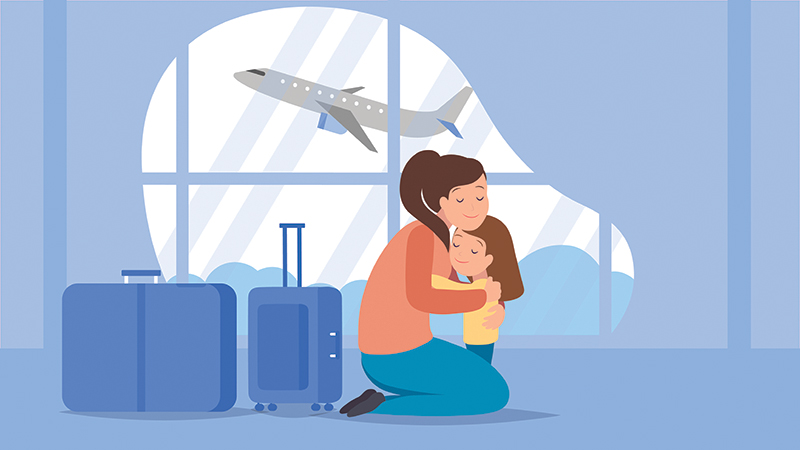A Guide to Parents When They Have To Travel for Work
Travelling for work can be made less stressful if you plan it well. Children saying their bon voyages as parents leave for their trip need not be necessarily be heart breaking moments.

My head was hurting, my heart was racing, and I felt I couldn’t breathe. All these were happening exactly at the same time while I was waving goodbye to my young children to join my husband for his business trip aboard a few years back. Leaving my children -- for an extended period of time -- for the first time was not easy, and is still not easy after all these years. It was one of the weirdest moments of my life that I still find it very hard to describe in words.
When you have children, traveling for work or to accompany your spouse --what many consider a perk -- may, if not planned well, feel more like a downer. Going on a business trip, whether for a weekend or for a month or longer, is a difficult situation not only for parents but also for children.
Since there’s likely very little you can do about the need to go on a trip, these tips will at least help make those trips less stressful for your family.
Inform the children: How far in advance should one inform about the trip depends on the duration of the trip and the child’s age. “Informing children 3 years old and younger too far ahead of time does not help them, especially if the focus is on talking about the parent being gone and for how long,” says Julia Heberle, an Associate Professor of Psychology at Albright College, and a Developmental Psychologist. “Children this age have barely mastered time vocabulary, so ‘tomorrow’ can just mean ‘not now,’ or ‘forever away.’ ” In case of older children, they often benefit from more advanced notice because it lets them get used to the idea and the plan.
Give the details: When I have to travel I sit down with my children and talk with them about the details involved in the trip. I include everyone -- my youngest daughter to my teenage son -- in the conversation. I often print my itineraries and put that in their study table or on the fridge. Tell your child when you’re leaving, where you’re going, what you’ll be doing, how he or she can contact you, and when you’ll return. Young kids may not understand what Monday or August 20th means, so mark your departure and return dates on a colorful calendar. Tell her to cross out one day each morning when she wakes up, and you’ll be home on the day marked with the star (or whatever other sign you choose). Help her understand where you’ll be going by showing photos of that place, pointing out the location on a map, or, for older kids, researching it on the Internet or in a book. Let her know who will be taking care of her while you’re away, and whether he will stay home or have to stay elsewhere, like grandparent’ house.
Stick to routines: Keep things on the home front as close to normal as possible. Having a parent away on business is already difficult, and having both parents away is doubly difficult. So it’s best not to make any additional changes that will disrupt kids’ lives, says Rochelle Harris, Ph.D., a Pediatric Clinical Psychologist at Children’s Mercy Hospitals and Clinics in Kansas City. If you child is staying with a family member, leave detailed instructions on bedtimes, feeding schedules, who needs to be where when, and any other necessary information to keep things consistent.
Stay connected: In today’s uber-connected world, it’s easy to stay in touch by phone, e-mail, and video calls, but you need to figure out what works best for your children and your travel schedule. Time differences, flight delays, work commitments, and other travel factors can make connecting at the right time a trick. Don’t promise to call if there’s any chance that won’t happen, or feelings may be hurt.
Return with love: After a long week of meetings and travel you probably can’t wait to get home to relax. But “When kids haven’t seen you for a while, they want to share everything that’s happened, see what souvenirs you bought, and hear about your trip,” says Dr. Mihalas. Being abrupt or saying you need alone time will make your child think he isn’t important (after all, she feels you already had time away). Dr. Mihalas Ph.D., a Psychologist and Founder of The Center for Well-Being in Los Angeles, recommends spending at least 15 to 20 minutes with young children when you arrive home--giving hugs and kisses and catching up. By spending time with your child first and making the transition a natural one will make your return positive and your future departures -- when you need to travel the next time -- will be less anxious for you and your child.
With some sensitivity and creativity, and perhaps a little trial and error, you can figure out how to prepare your child for your travels and what are the best ways to feel close when you’re far away. That way, both your goodbyes and trips will go smoothly.


